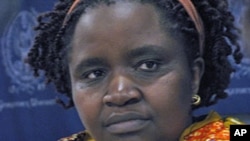As U.N. Special Representative for Sexual Violence In Conflict Margot Wallstrom embarks on a new trip to the Democratic Republic of Congo, two activists recently concluded lobbying efforts in the United States for more effective action on trying to end conflict-related rapes in Congo.
One of them, Justine Masika Bihamba, told a gathering of Washington, D.C., university students and concerned citizens that the area in which she works, Beni, in North Kivu province, is still overrun by Ugandan rebels who regularly rape women.
She said in these situations women are considered victims, and are not implicated in the search for peace.
Striving for peace in the region
Bihamba coordinates an organization called the Synergy of Women Against Sexual Violence. Counselors with the group have been attacked and threatened because of their work. When Bihamba was at work one day, Congolese soldiers attacked her home, and sexually assaulted one of her daughters.
Bihamba explained that what is needed - above all - is peace in eastern Congo. She said she believes sexual crimes would go down drastically if fighting stopped.
Activist Donatella Rostagno, from the European network for Central Africa, accompanied Bihamba on her trip to the United States. She said she supports the work being done by the U.N. special representative for sexual violence in conflict. Rostagno also said feels, however, the international community is not doing enough to stop Congo's war, despite having a large U.N. peacekeeping mission there.
"The majority of the actions is made to look at the consequences, to work with the women who are victims, but not enough is done to look at the causes of the rapes and the conflict," said Rostagno.
Deteriorating situation amid global concern
She fears the overall situation in eastern Congo is getting worse, not better - despite the international attention - with rebels, militias, and renegade soldiers still running rampant.
"A lot of these rebel groups are getting reorganized, and are even getting in a coalition so the movements that we see in the region, it is worrying us," said Rostagno. "I think we were more optimistic on this region six months ago than today."
The United Nations has identified three armed groups that gang raped dozens of people about two months ago in a week-long attack in Luvungi, another part of North Kivu province. Those implicated are the Mai Mai Cheka, the Democratic Liberation Forces of Rwanda, and followers of an army deserter, Colonel Emmanuel Nsengiyumva.
Proposals for improvement
During their presentation, the two activists, Bihamba and Rostagno, also offered concrete proposals to make the situation better.
Rostagno explained that foreign non-governmental organizations get funding to tackle the issue of sexual violence, but local organizations often get ignored. She said complex applications to get outside funding favor bigger organizations.
"They can just do it, they send it, they receive the money. The problem is that the money in most cases is spent to pay for the fixed cost of the organization, for the salaries of expat people coming to the region and to the country, while the local non-governmental organizations, those working with the communities, with the women, with the children, in the villages, those who need need money to survive in order to do their work do not have access," said Rostagno.
Bihamba said Congolese soldiers should be paid directly through bank withdrawals, rather than being paid through their superiors. Bihamba said with the current system they receive only about a third of their salary, which causes some soldiers to loot and rape.
She also called for an international tribunal for the Congo to help end general impunity, as well as more local tribunals for raped victims to seek justice. In North Kivu, where more than 5 million people are estimated to live, she said there are only three tribunals.




